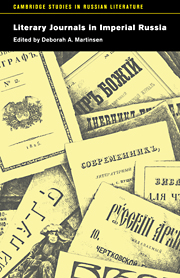Book contents
- Frontmatter
- Contents
- Notes on contributors
- Acknowledgements
- 1 Introduction
- PART I EIGHTEENTH CENTURY
- PART 2 EARLY NINETEENTH CENTURY
- 3 Periodicals in literary life of the early nineteenth century
- 4 N. A. Polevoi's Moscow Telegraph and the journal wars of 1825–1834
- PART 3 MID NINETEENTH CENTURY
- PART 4 SILVER AGE
- List of titles of journals and almanacs
- Select bibliography
- Index
- CAMBRIDGE STUDIES IN RUSSIAN LITERATURE
3 - Periodicals in literary life of the early nineteenth century
Published online by Cambridge University Press: 11 March 2010
- Frontmatter
- Contents
- Notes on contributors
- Acknowledgements
- 1 Introduction
- PART I EIGHTEENTH CENTURY
- PART 2 EARLY NINETEENTH CENTURY
- 3 Periodicals in literary life of the early nineteenth century
- 4 N. A. Polevoi's Moscow Telegraph and the journal wars of 1825–1834
- PART 3 MID NINETEENTH CENTURY
- PART 4 SILVER AGE
- List of titles of journals and almanacs
- Select bibliography
- Index
- CAMBRIDGE STUDIES IN RUSSIAN LITERATURE
Summary
Early nineteenth-century Russia – 1800 to 1840 for the purposes of this survey – features a confusing variety of literary movements (Sentimentalism, Classicism, Romanticism), a wealth of literary genres, and at least four institutions of literature: patronage, familiar associations (student groups, salons), the chapbook trade (lubok), and incipient professionalism. The plethora of cultural possibilities occasioned, in turn, a widespread obsession with literature as a social activity. Contemporary essays and works of literature addressed every conceivable aspect of literature as an actual or potential institution: the status and role of the writer; the reader's role in the literary process; the proper subjects and language for literature; literature as a mode of association; literature and social concerns (education, leisure, morality); literature and the marketplace; censorship. Although familiar associations – over four hundred literary salons and student circles – still dominated Russia's literary life, at least at the beginning of the period, concern with the possibilities and problems of the periodical press figured prominently in these critiques of Russian literary culture.
The decades covered by this outline witnessed three major and interrelated developments in Russian journalism: (1) the rise of periodicals, such as The Messenger of Europe (Vestnik Evropy, 1802–30), which would be more far-ranging in their content than their eighteenth-century predecessors; (2) the rise of commercially viable periodicals, such as The Library for Reading (Biblioteka dlia chteniia, 1834–65), which would encourage, if not enable, the rise of a profession of letters in Russia and the spread of literary culture beyond the salons of the two capitals; and (3) a shift in the orientation of the literary criticism in these journals from the sort that would be helpful to writers preparing their texts to the sort that would entertain and form a reading public.
- Type
- Chapter
- Information
- Literary Journals in Imperial Russia , pp. 37 - 63Publisher: Cambridge University PressPrint publication year: 1998



